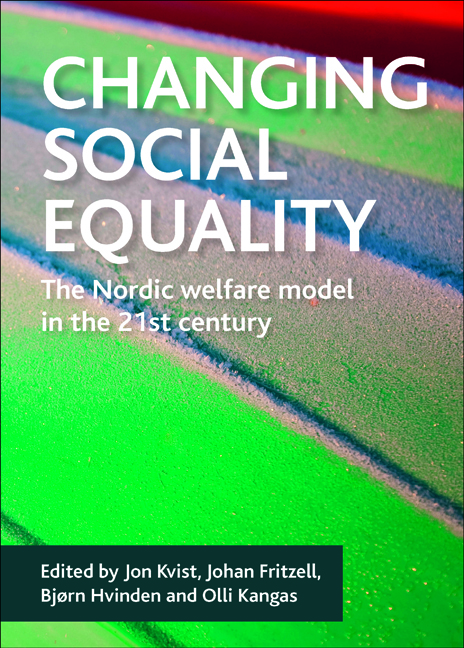Book contents
- Frontmatter
- Contents
- List of tables and figures
- Notes on contributors
- Acknowledgements
- one Changing social inequality and the Nordic welfare model
- two Anti-immigration attitudes, support for redistribution and party choice in Europe
- three Do we all (dis)like the same welfare state? Configurations of public support for the welfare state in comparative perspective
- four Eroding minimum income protection in the Nordic countries? Reassessing the Nordic model of social assistance
- five Equality in the social service state: Nordic childcare models in comparative perspective
- six Welfare state institutions, unemployment and poverty: comparative analysis of unemployment benefits and labour market participation in 15 European Union countries
- seven Social inequalities in health: the Nordic welfare state in a comparative context
- eight Income inequality and poverty: do the Nordic countries still constitute a family of their own?
- nine Is immigration challenging the economic sustainability of the Nordic welfare model?
- ten Nordic responses to rising inequalities: still pursuing a distinct path or joining the rest?
- Index
two - Anti-immigration attitudes, support for redistribution and party choice in Europe
Published online by Cambridge University Press: 01 September 2022
- Frontmatter
- Contents
- List of tables and figures
- Notes on contributors
- Acknowledgements
- one Changing social inequality and the Nordic welfare model
- two Anti-immigration attitudes, support for redistribution and party choice in Europe
- three Do we all (dis)like the same welfare state? Configurations of public support for the welfare state in comparative perspective
- four Eroding minimum income protection in the Nordic countries? Reassessing the Nordic model of social assistance
- five Equality in the social service state: Nordic childcare models in comparative perspective
- six Welfare state institutions, unemployment and poverty: comparative analysis of unemployment benefits and labour market participation in 15 European Union countries
- seven Social inequalities in health: the Nordic welfare state in a comparative context
- eight Income inequality and poverty: do the Nordic countries still constitute a family of their own?
- nine Is immigration challenging the economic sustainability of the Nordic welfare model?
- ten Nordic responses to rising inequalities: still pursuing a distinct path or joining the rest?
- Index
Summary
Introduction
The increasing level of ethnic heterogeneity in Europe has spurred a debate about the relationship between ethnic diversity and income redistribution by the state. The current debate is much inspired by Alesina and Glaeser's (2004) sceptical view of the possibility of reconciling ethnic diversity and generous welfare arrangements.
The debate about the relationship between ethnic diversity and the welfare state is of particular interest for the Nordic countries, which developed their comparatively generous welfare states in a context of ethnic homogeneity. Over the last three decades, however, non-Western immigration has made the Nordic countries less homogeneous. In Denmark and Norway, issues of integration of immigrants have been high on the public and political agendas for some time, and both countries have relatively large anti-immigration parties in their parliaments. In Sweden, the immigration issue was hotly contested in the 2010 election, and the Sweden Democrats, an anti-immigration party, won 20 seats in the Swedish parliament. Anti-immigration parties are, or have very recently been, represented in the Finnish and Icelandic parliaments as well. Therefore, the issues that this chapter discusses are highly important for all the Nordic countries.
This chapter focuses on two mechanisms through which ethnic heterogeneity can have an impact on the degree of redistribution. First, ethnic heterogeneity might decrease voters’ support for redistribution and thus shift the political centre of gravity on the redistributive dimension in a Rightist direction. Alesina and Glaeser (2004) argue that voter animosity towards minorities is an important reason why the US has a much smaller welfare state than most European countries: racist attitudes directly reduce the preferred level of redistribution because redistribution disproportionably benefits immigrants, or is perceived as doing so. Using the language of Roemer et al (2007), I label this potential mechanism the ‘anti-solidarity’ hypothesis, for which there exists weak support, at best, in studies of European cross-sectional survey data (Finseraas, 2008; Senik et al, 2009; but see Eger, 2010). This chapter expands on these studies by exploring the relationship between change in xenophobia and change in support for redistribution at the aggregate level between 2002 and 2008. Examining whether these variables move together over time is obviously a better test of the ‘anti-solidarity’ hypothesis than examining the association at one point in time, especially since there are some indications that changes in the size of the immigrant population is negatively correlated with changes in social spending (Soroka et al, 2006).
- Type
- Chapter
- Information
- Changing Social EqualityThe Nordic Welfare Model in the 21st Century, pp. 23 - 44Publisher: Bristol University PressPrint publication year: 2011

